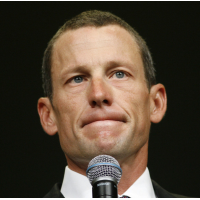Judge Orders Lance Armstrong to Come Clean about Doping throughout his Entire Career…but his Lies are Protected
 Lance Armstrong (photo: Peter Morrison, AP)
Lance Armstrong (photo: Peter Morrison, AP)
Lying to the world about your drug use won’t make you liable in court, but lying to your insurance company about it sure will.
That’s the bottom line of two recent decisions in two legal cases filed against disgraced cyclist Lance Armstrong, who admitted earlier this year to extensive doping during his career—something he had aggressively denied for years. The U.S. Anti-Doping Agency has disqualified all of his results since August 1998, including his seven Tour de France victories, and banned him from cycling for life.
In the case of Stutzman v. Armstrong, PR consultant Rob Stutzman wanted to represent a class of consumers whom Armstrong and his publishers allegedly misled to believe that his autobiographies, It’s Not About the Bike: My Journey Back to Life, and Every Second Counts, were “truthful and honest works of nonfiction biography or autobiography when, in fact, defendants knew or should have known that these books were works of fiction.” Armstrong repeatedly denies doping in the books.
Nevertheless, U.S. District Judge Morrison England Jr. of the Eastern District of California in Sacramento ruled last week that the First Amendment protects Armstrong’s dishonesty, because statements in the books are considered “conduct in furtherance of the exercise of...free speech in connection with a public issue or an issue of public interest.”
“The conduct at issue is the speech about the book and Armstrong's speech about whether he used drugs,” wrote England. “Armstrong’s lies about his use of drugs are simply not criminal conduct,” and hence fall within free speech protections.
In the case of Acceptance Insurance Company v. Armstrong, however, Travis County, Texas, Judge Tim Sulak has ruled that the insurance company—which sued the cyclist earlier this year over bonuses it paid for his now voided victories in the Tour de France from 1999 to 2001—has the right to ask questions and get answers about doping throughout his career.
Armstrong, who has settled a similar case with SCA Promotions over $12 million in bonuses it paid him for Tour victories, wanted to limit the scope of the questions to the period of 1995 to 2001. His attorney called questions beyond those years “overbroad fishing expeditions not reasonably calculated to lead to the discovery” of evidence but really intended to make “a spectacle of Armstrong’s doping, rather than legitimately pursuing the claims in its lawsuit.”
Judge Sulak overruled Armstrong’s objections, but preserved Armstrong’s claims of attorney-client and spousal privilege. The questions Armstrong must answer by September 30 concern 1995 to 2010, and ask in which races he doped, when his teammates doped as well, and who provided and paid for the drugs.
-Matt Bewig
To Learn More:
Wide Berth for Discovery in Lance Armstrong Suit (by David Lee, Courthouse New Service)
Lies in Lance Armstrong Biographies Have Shield (by Heather Johnson, Courthouse New Service)
Discovery Ruling (Hon. Tim Sulak) (pdf)
Stutzman v. Armstrong (Hon. Morris C. England) (pdf)
Will Justice Dept. Be Forced to Reopen Case against Lance Armstrong? (by Matt Bewig, AllGov)
Was the Lance Armstrong Doping Case Whitewashed by U.S. Attorney While Investigation Continued? (by Noel Brinkerhoff, AllGov)
- Top Stories
- Unusual News
- Where is the Money Going?
- Controversies
- U.S. and the World
- Appointments and Resignations
- Latest News
- Trump to Stop Deportations If…
- Trump Denounces World Series
- What If China Invaded the United States?
- Donald Trump Has a Mental Health Problem and It Has a Name
- Trump Goes on Renaming Frenzy






Comments